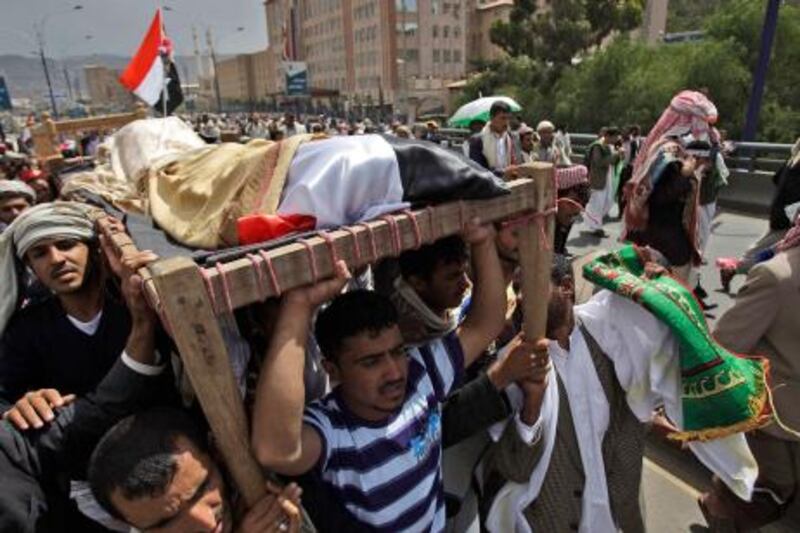SANA'A // Anti-government forces attacked Yemen's presidential compound with rockets yesterday, wounding the nation's leader as he prayed in a mosque, and plunging the country ever closer to all-out civil war.
The attack, reportedly launched from nearby rooftops, killed the mosque's imam and three security officers while injuring President Ali Abdullah Saleh and at least seven other senior officials, a government spokesman said. Mr Saleh was later reported to be safe after treatment in a military hospital and was scheduled to make a televised speech late last night.
The government blamed the shelling on Hashed tribesmen led by Sheikh Sadeq al Ahmar, whose powerful tribal bloc has threatened to bring 40,000 more troops to the capital to topple Mr Saleh's regime. Sheikh Ahmar later denied responsibility and blamed Mr Saleh for staging the attack, saying it was used to help justify a government escalation of the fighting that has engulfed the country and left more than 370 people dead, including at least 155 in the last 10 days. Tribal forces continued in block-to-block gun battles with government troops across Sana'a after yesterday's rocket attack, witnesses said, and the home and neighbourhood of Sheikh Ahmar and his family was struck by government artillery.
Abdul Qawi Qaisi, a Hashed spokesman, claimed that Mr Saleh had launched the attacks on the presidential compound in order to justify the punitive strikes against the tribal leader.
"The [palace] attacks were a cover. We would announce responsibility for the attacks if we were behind them," said Mr Qaisi.
Mohammed Qahtan, spokesman for the opposition coalition known as the Joint Meeting Parties, said Mr Saleh was using the attack and its coverage on state-run media as a ploy to earn sympathy from the Yemeni people.
"The attacks on the presidential palace were orchestrated by President Saleh," Mr Qahtan told The National.
Suspicion has also fallen on renegade General Ali Mohsen, who defected to the opposition in April and who sent his troops to the capital to protect anti-Saleh demonstrators. Gen Mohsen's forces, including thousands of soldiers backed by tanks and armoured vehicles, have also engaged Mr Saleh's forces in street battles this week.
The confusion over who may be behind the attack underscores the turmoil in Yemen where armed tribesmen, Islamic militants, youth-led protest groups and a political opposition are all pushing for Mr Saleh to step down, while the wily 69-year-old leader stubbornly clings to power.
The situation has exasperated his former US and Saudi allies, who had once seen him as a key partner in efforts to combat al Qa'eda's ambitious Yemen-based affiliate, al Qa'eda in the Arabian Peninsula.
Defying regional neighbours, Mr Saleh has three times reneged on a deal brokered by the Gulf Cooperation Council that requires him to quit in return for immunity from prosecution.
The secretary-general of the GCC yesterday urged all parties in Yemen to end the fighting.
"The ministerial council of the GCC is following with concern and sadness the deteriorating situation and the continued fighting. This situation is regrettable and benefits no one," Abdulattif al-Zayani told Al Arabiya television.
The Saleh government insisted late yesterday that Hashed forces were behind yesterday's mosque attack as well as other violence across the capital.
Tareq al-Shami, a government spokesperson, said that at least seven senior officials were injured in the mosque attack. Mr Shami said that more than 50 senior Saleh officials, including nine ministers, were in the mosque during the attack. He said that the prime minister, parliament speaker, deputy prime minister, and the governor of Sana'a were all injured, along with many others. He also claimed that some of the biggest pro Saleh tribal leaders were among the injured.
"These official were in worship but the tribes have no fear even from God. This is why they must be fought." Mr Shami said. "These tribes are the real terrorists. They attack everything without counting the casualties."
Crowds of pro-Saleh supporters who gathered at Sabeen square yesterday said they were fired upon by tribesmen while protesting peacefully. According to a witnesses, seven supporters were shot by the Hashed tribes.
Soon after the palace attack, the Republican Guards, an elite army regiment led by Mr Saleh's son, launched heavy attacks with mortars and other weapons on the homes and neighbourhood of Sheikh Ahmar and his family. The shelling also targeted the house of Gen Mohsen. Witnesses reported seven locals injured by gunfire.
The government is said to have launched hundreds of missile into the Hadda area of southern Sana'a, a tribal stronghold. Thousands of Hadda residents have evacuated the area.
Dr Abdul Nasser al-Mowdie, an academic at Sana'a University, said that the chances for a peaceful end to Mr Saleh's 32-years in power may now be over.
"The victory for the Yemeni revolution will be solved militarily and not peacefully. Four months have passed, and protesters are only getting weaker by the day," said Mr Mowdie, noting that peaceful protests have given way to bloodshed.
"Demonstrators in protest camps cannot be compared to the people who are sacrificing their lives for change."
Violence and anti-Saleh protests continued in 18 of Yemen's 21 provinces yesterday. Before the attack on the palace, protesters paraded the coffins of 50 people killed by Mr Saleh's forces.
Explosions were heard in the southern city of Taiz, where the United Nations has said it is investigating reports that 50 people have been killed since Sunday.
Two policemen were killed in a rocket-propelled grenade attack, medical officials said, after security forces fired warning shot earlier at protesters gathering for Friday prayers. Islamist militants yesterday continued their control of the coastal city of Zinjibar.





